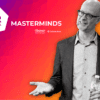
Future Literacy and the LEARNER Framework: A Vital Asset for HR Professionals
today2023.05.24. 963 5


Scott D McArthur, Professional Speaker and Entrepreneur
WHY SHOULD YOU CARE?
Discover the transformative power of Future Literacy, a crucial skill in a rapidly changing world. Learn how the LEARNER framework can enhance your foresight and adaptability as an HR professional. Gain insights on observing emerging trends, evaluating their impact, anticipating challenges, nurturing a learning culture, engaging strategic foresights, and reinventing practices. Prepare yourself to shape your organization’s future and thrive amidst uncertainties.
“The future is a foreign country, and we are all in danger of becoming refugees,” a somewhat sombre yet stimulating thought to contemplate. But even within this contemplation lies a beacon of hope, reminding us of our innate human capacity to adapt and evolve. By learning from yesterday, living for today, and hoping for tomorrow, we journey into the future not as refugees but as explorers. This critical capacity to understand and interact with the dynamic interplay between the present and the future is known as Future Literacy.
Future Literacy is a transformative capability that goes beyond mere foresight. It empowers individuals and organisations to perceive and comprehend the profound influence of the future on our perceptions and actions today. This skill is becoming increasingly important in a world marked by rapid technological advancements, shifting demographics, and social changes. With Future Literacy, we can anticipate evolving circumstances, ensuring our preparedness, resilience, and adaptability.
Nowhere is this skill more essential than in the realm of Human Resource Management. As stewards of an organisation’s most valuable resource – its people – HR professionals are at the vanguard of managing change. They must be equipped with the knowledge, skills, and foresight to guide teams and leadership through the turbulent waters of the future of work. But how can HR professionals cultivate this vital capability?
To this end, the LEARNER framework offers a robust and practical tool for enhancing Future Literacy. It consists of seven key components: Look, Evaluate, Anticipate, Reflect, Nurture, Engage, and Reinvent.
Look: The first step requires a vigilant and open-minded approach. Observing the current landscape and keeping an eye on emerging trends in technology, demographics, societal changes, and more is crucial. For instance, with the rise of remote work due to the COVID-19 pandemic, HR professionals need to be aware of the implications this trend has on employee engagement, communication, and productivity.
Evaluate: After observing, the next step involves deep analysis. How might these shifts impact your organisation and the wider industry? If Artificial Intelligence is likely to automate certain job roles in your organisation, what will be the implications for employees currently in those roles? How can HR help to mitigate the impacts?
Anticipate: Drawing on the insights gained from observation and evaluation, HR professionals must then predict future trends, challenges, and opportunities. Anticipating future workforce needs could mean investing in employee reskilling programs to prepare for the increased adoption of automation or AI technologies.
Reflect: With anticipation comes the need for introspection. Reflecting on potential effects of future trends on your organisation and role as an HR professional helps in formulating appropriate responses. It could involve scenario planning, where different potential futures are envisioned, and strategies are developed for each.
Nurture: An important aspect of Future Literacy is fostering a culture of continuous learning and adaptability. Encouraging a growth mindset within your organisation promotes resilience in the face of change. HR could develop mentoring and coaching programs or cultivate a culture that embraces and learns from failure rather than fearing it.
Engage: The penultimate step involves integrating your foresights into your strategies and practices. If flexible work arrangements are likely to become the norm, how can HR ensure that policies support this shift? How can technology be leveraged to facilitate better communication and collaboration?
Reinvent: The final element of the LEARNER framework calls for constant evolution. With shifting industry trends and emerging workforce demands, the ability to reinvent strategies and practices to stay relevant is key. This could mean redefining job roles, redesigning organisational structures, or encouraging new models of work.
The future, though ever-shifting, isn’t something to be feared. Rather, it is a landscape rich with possibilities and challenges that can be navigated confidently with the right mindset and tools. By leveraging the LEARNER framework, HR professionals can not only enhance their Future Literacy but become active drivers shaping the course of their organisations’ future.
In this journey, let us remember that the future begins today. By learning from the past, living in the present, and hoping for the future, we become better prepared to face the uncertainties of tomorrow. With continuous questioning comes learning, and with learning comes adaptability – the key to not just surviving but thriving in the future. As HR professionals, embracing Future Literacy through the LEARNER framework offers a compelling way to navigate this journey, leading our organisations confidently into the future.

Written by: Mihaly Nagy
Future of HR HR Strategy Learning Learning & Development
Previous post

- 5225
labelArticles today2023.05.22.
Slicing your L&D budget pie… Solved?
WHY SHOULD YOU CARE?Discover the secret to effectively managing your Learning & Development budget! This guest post by Marco Mullers highlights how L&D professionals face the challenge of prioritizing initiatives, [...]
Similar posts

labelArticles today2024.10.21.
The success-recipe to build agile and future-ready organizations in 2025 and beyond







Post comments (0)